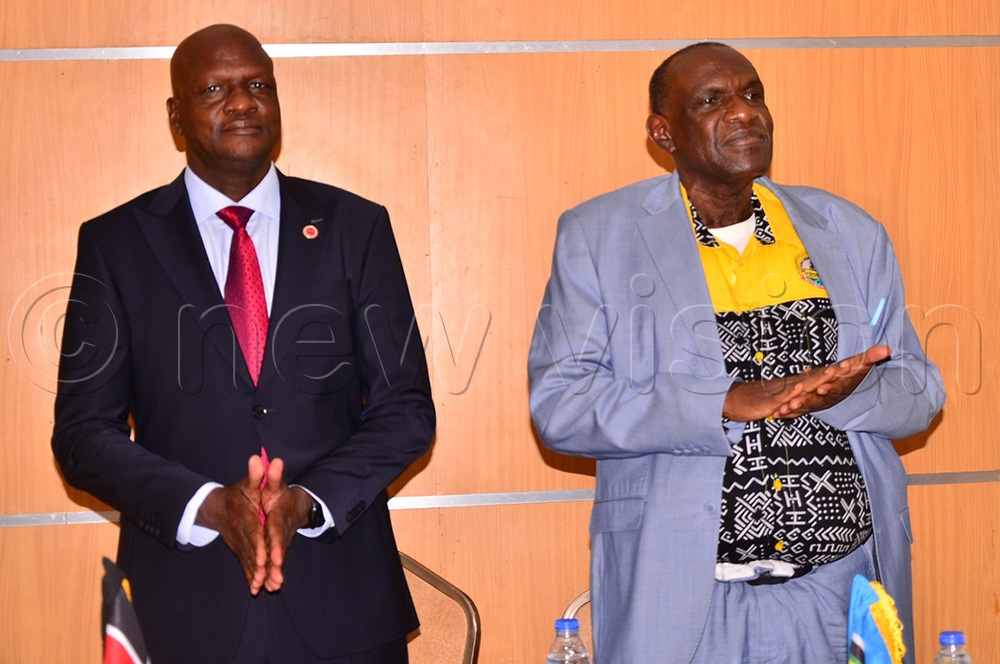Uganda and Kenya report gains against cattle rustling
Yunus Kakande, the permanent secretary in the Office of the President, who officiated at the opening of the meeting, said the decision to establish immigration posts in Bukwo and Kotido had strengthened efforts to curb cattle rustling.
Kakande (seated centre), flanked by top Kenyan officials on the left and Uganda on the right, and the rest at the ongoing 14th Kenya-Uganda Joint Border Commission meeting in Jinja on Wednesday. (Credit: Jackie Nambogga)
JINJA - Uganda and Kenya have announced significant progress in reducing cattle rustling, a security threat that has long affected communities along their shared border.
According to Jacob Narenga, Kenya’s principal administrative secretary in the ministry of interior and national administration, the vice is now largely under control.
He attributed the achievement to bilateral cooperation under the Kenya–Uganda Joint Border Commission (JBC), which he said has helped address cross-border challenges relating to peace, security and socio-political and economic stability to support trade.
Speaking at the 14th Kenya–Uganda JBC meeting at the Source of the Nile Hotel in Jinja city on November 26, 2025, Narenga said cases of cattle rustling in Kenya had reduced significantly after the government declared it a crime and imposed strict measures.
He added that the country has continued to recover illegal firearms from individuals identified as criminals, bandits and cattle rustlers.
Meanwhile, Yunus Kakande, the permanent secretary in the Office of the President, who officiated at the opening of the meeting, said the decision to establish immigration posts in Bukwo and Kotido had strengthened efforts to curb cattle rustling.
He noted that the raids had been carried out by the Turkana and Pokot communities of Kenya and the Pokot in Uganda, as well as other groups in Karamoja.
Kakande explained that the Karamojong would previously raid areas as far as Kidongole in Kumi district and parts of Mbale. Despite the complexity of the issue, he said Uganda had managed to significantly reduce the problem.
“The entire Karamoja would have been a cattle rustling region, and as we are speaking, President Yoweri Museveni has tried as much as possible to fight the vice,” he said.
He observed that the region now experiences isolated cases of theft rather than the organised raids that once destabilised communities. Kakande also welcomed the resumption of JBC meetings, which had stalled for five years due to the Covid-19 pandemic and general elections in both countries.
Narenga and Kakande (R) at the official opening of the 14th Kenya-Uganda Joint Border Commission meeting at the Source of Nile hotel in Jinja city on Wednesday. (Credit: Jackie Nambogga)
He urged participants to review the progress and implementation of resolutions from the 13th JBC meeting held in September 2019 in Mombasa, Kenya.
These resolutions covered issues such as immigration and cross-border crime, illegal small arms, drug trafficking, boundary reaffirmation and demarcation, cross-border education, agriculture and disaster management.
Kakande said it was important for the meeting to approach discussions with firm commitment to implement decisions that would be collectively agreed upon.
He added that during the mid-term review of the second session of the Kenya–Uganda Joint Ministerial Commission held in Nairobi from 11 to 13 August 2025, the two governments adopted key resolutions relating to peace and security, water and environmental management, gender and social development, education and trade.
He encouraged participants to ensure that directives from the Joint Ministerial Commission align with the resolutions of the JBC. Kakande further reminded the meeting that their deliberations should support existing bilateral frameworks and commitments under East African Community protocols.
Under the JBC arrangement, he said residents of both countries are now allowed to cross borders and purchase essential household commodities in small quantities without facing arrest, a change intended to ease daily life for border communities.
“People at the borders would move to buy small things like sugar or flour and get arrested, yet we are brothers, under the JBC, we decided this not to happen anymore, and I hope it is still on without impediments at all,” he said.
Kakande reaffirmed Uganda’s commitment to the JBC process, noting its importance to good neighbourliness, regional stability and shared prosperity. He expressed confidence that the meeting would yield practical, actionable and time-bound resolutions supported by renewed commitment to implementation.
He added that he was optimistic that the collective expertise and cooperation of participants would result in productive and constructive deliberations throughout the session.